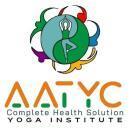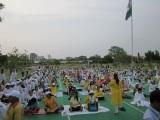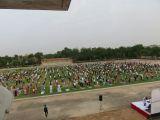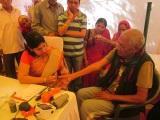Teachers’ Training Course
The AATYC – Yoga Insituite Yoga Teachers’ Training Course (TTC) is an internationally-acclaimed four-week intensive residential programme. Develop the skills to teach yoga in the classical tradition and at the same time deepen your spiritual connection. Establish a firm foundation of discipline and build a strong base from which to teach others with confidence. Learn yoga in a traditional Ashram immersed in the yogic lifestyle with our dedicated teachers.
In this four-week course you will establish a firm foundation of discipline that promotes physical, mental, emotional, and spiritual growth and build a strong base from which to teach others naturally and with confidence.
Discipline is an important part of the course and students are guided to maintain discipline and a proper diet while attending from home.
The goal of the programme is to produce qualified and inspiring yoga teachers who are able to draw on their own practice and personal discipline in imparting the yoga experience to others.The intensive daily schedule includes:
- Name of the Certification: Level-1
- Course level: Level-1
- Requirement/Eligibility:
- For open candidates, there are no eligibility criteria
- For admission in the course, it is suggested/ desired that the candidate should have passed 10th standard / secondary school certificate from a recognized board or equivalent. However, the Yoga Institutions can define their own eligibility
- Brief Role Description: Certified Yoga Professionals can
teach basics of Yoga / common Yoga protocol developed by the Ministry of AYUSH for International Day of Yoga for prevention of diseases and promotion of health. They can conduct Yoga practice /classes in parks, societies, RWA etc. - Minimum age: No age limit
- Personal Attributes: The job requires individuals to have good communication skills, time management skills and ability to understand the body language of the trainees. The job requires individuals to possess key qualities such as self-discipline, confidence, maturity, patience, compassion, active listening, time management, empathetic, language proficiency.
- Credit points for certificate: 12 credits
- Duration of course: Not less than 200 hours or not less than 3 months as part-time or not less than 1 month as a full-time course.
- Mark Distribution: Total Marks: 200 (Theory: 60 + Practical: 140)
asana classes • two lectures • one hour of karma yoga
One day a week is lecture-free.
Asanas
The twelve basic postures in depth
Practice of classical advanced variations
Precise and detailed corrections
Prolonged holding of the asanas
Deeper understanding of hatha yoga
Pranayama
Practice of kapalabhati
Daily practice of anuloma viloma
Advanced pranayamas
Use of bandhas
Meditation
Guide to meditation
What is meditation?
Why meditate?
Concentration and thought power
Effects of and experiences in meditation
Mantras
Mantra initiation (optional)
Yoga Anatomy and Physiology
The effects of asanas and pranayama on the: cardiovascular, respiratory, digestive and skeletal and muscular systems
Yoga and physical culture
Yoga Nutrition
Vegetarianism for physical, mental and spiritual health
How diet affects the mind
Principles of nutrition
Healing effects of fasting
Kriyas
The six classical purification exercises for the eyes, nose, air passages, oesophagus and stomach, abdominal organs and large intestine. Explanation and demonstration of the exercises and their effects. Individual instruction.
• tratak • neti • kapalabhati • dhauti • nauli • basti
Teaching Practice
How to teach the 12 basic postures and breathing exercises to beginners and intermediate students
Setting up of a proper environment for class
General pointers on teaching a class
The Basic Sivananda Class
Beginners’ course
Advanced postures
Yoga for children
Yoga for older citizens
Yoga for pregnancy
Relaxation
Detailed correction workshops
In the second half of the training course, participants will teach each other under the guidance of an experienced teacher.
Bhagavad Gita
One of the greatest spiritual texts of the world, the Bhagavad Gita contains subtle and profound teachings and has a universality which embraces every aspect of human action.
Karma and Reincarnation
The law of cause and effect
The law of action and reaction
Destiny and self-effort
Samsara, the wheel of birth and death
Hatha Yoga
Ethical and moral principles
Body, prana and mind
From control over the body to control over the mind and meditation
Raja Yoga
Ashtanga: the eight limbs of yoga
Antahkarana: functions of the mind
Concentration and meditation
Overview of Kundalini yoga
Bhakti Yoga
Kirtan: chanting of devotional songs.
Sanskrit mantras, Indian deities and their cosmic meaning
Arati and pujas (traditional Indian devotional rituals)
Karma Yoga
Karma Yoga – selfless service: one hour daily in the Ashram community.
Jnana Yoga
Basic concepts of Vedanta philosophy
The seven bhoomikas or planes of consciousness
Space, time, causation
The three bodies
The three levels of the mind
Conquest of death












